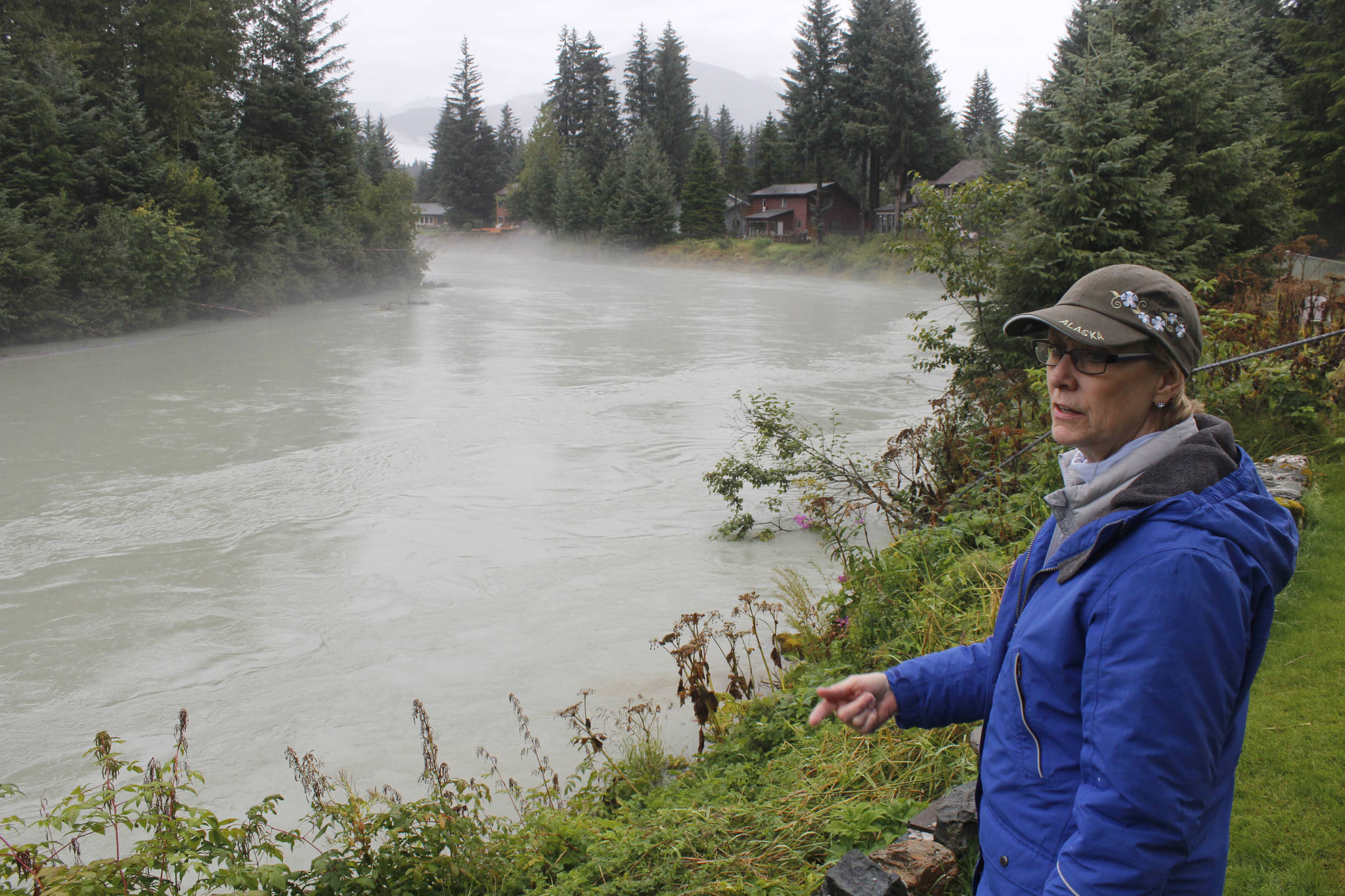The group of neighbors living along the eroding banks of the Mendenhall River and City and Borough of Juneau staff have been going back and forth about how to best address the erosion, and the neighbors brought a new proposal to the city last week.
The best way to get the full neighborhood on board with a riverbank restoration project, the neighbors said in a letter to the city, is to put a cap on the amount each homeowner would pay. The Natural Resources Conservation Service (NRCS) has been putting a plan together for installing siding along the river, but the plan would cost the homeowners an estimated $78,500 each.
Last week’s brief letter, penned by Meander Way resident Nico Bus, proposed capping the spending at a much lower level.
“We feel the best chance for a restoration project along our riverbank will be a project with a cap of $40,000 per property,” the letter reads. “Ideally we will still work with the NRCS and the CBJ to make this project a reality.”
With the ever-changing Mendenhall River’s dynamic nature and with glacial flooding known as the jökulhlaup, the riverbank has been eroding quickly in the past five years. The city contacted NRCS in 2013 to search for solutions. NRCS would cover 75 percent of the project, which is estimated to cost nearly $8 million. That would leave the city to cover around $2 million, almost all of which would fall on the homeowners if CBJ goes along with the NRCS plan.
[City faces tough decision on Mendenhall River erosion]
Putting a cap on the spending per household would put many of the residents at ease, including Joyce Goehring. Goehring has been vocal about her opposition to the proposed plan, particularly about the unknown costs associated with it. While the NRCS plan calls for $78,500 from each homeowner, CBJ Engineering Director Roger Healy said in a July memo that the plan could call for as much as $105,000 per homeowner.
This concerned Goehring, who said that if the estimate is already rising before the project begins, she’s nervous about how much it could rise once the project actually starts.
“When you give the government a check, it’s gotta be a blank check, and we’re concerned that there’s no way to stop the runaway train once it gets rolling,” Goehring said.
She said she knows something has to be done for homeowners who are rapidly losing property, but said the NRCS plan is too involved. An NRCS diagram shows that with this plan to secure the riverbank, many residents would lose large portions of their land that would be used for the project. Goehring would lose 30 feet from her property if the plan goes through as proposed, she pointed out.
“I don’t understand how this has gotten into this giant, unruly monster of a project,” Goehring said, “that the city council seems to think, ‘Oh, this is gonna answer all of our problems. Let’s do this.’”
In his letter to the city, Bus wrote that based on an informal neighborhood poll, 25 of the 26 homeowners who responded said they would be in favor of a plan where a $40,000 cap were instituted.
City Manager Rorie Watt said that he and other staff members have reviewed the letter and the CBJ Assembly will likely discuss it at the Oct. 23 Committee of the Whole meeting. At the most recent Committee of the Whole meeting Aug. 10, Assembly members voted that the city would cover costs for staff time to date on the project. This would save the homeowners about $260,000 in total.
Watt said at that meeting the best-case scenario would be for the homeowners to get together and reach some kind of agreement on their own. Though he’s not sure if this proposal specifically would work, Watt said the letter from the homeowners is promising.
“They’ve clearly made some progress and that’s heartening,” Watt said, “but part of their process is assuming a fairly substantial amount of city support.”
If NRCS still paid 75 percent of the total fee — which is estimated at $7.7 million — and the city paid for $260,000 and the homeowners paid $40,000 each, that would leave about $550,000 that the city would have to find elsewhere. Watt said this would likely come from taxpayer money if the city were to go that route.
Assembly members have gone back and forth on the idea of whether or not to commit a large amount of money to the project, and have yet to come to a conclusion. Goehring said she’s getting impatient waiting for the city to make a decision one way or another.
“One of our frustrations is the council keeps pushing it back, ‘Let’s get it on next month’s (agenda),’” Goehring said. “We want them to say yes or no.”
• Contact reporter Alex McCarthy at alex.mccarthy@juneauempire.com or 523-2271.

